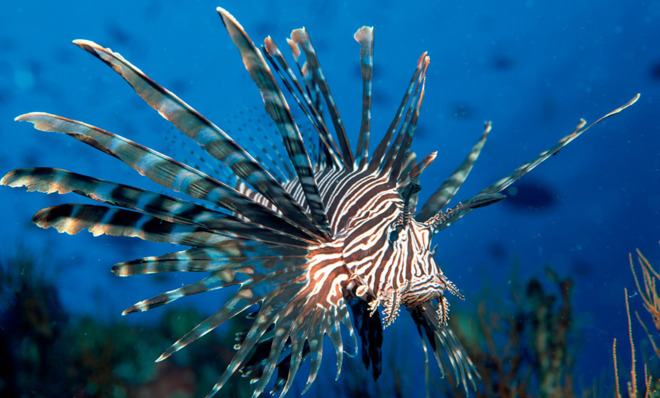Conservationists are murdering invasive fish to save the Caribbean. It might be backfiring.
The lionfish has proved to be a wily foe

A free daily email with the biggest news stories of the day – and the best features from TheWeek.com
You are now subscribed
Your newsletter sign-up was successful
With their zebra-esque stripes and fluttering spines, the lionfish looks pretty in an aquarium tank. But let them loose in the Atlantic Ocean, and things can get pretty ugly.
The fish are native to the Indo-Pacific, but were accidentally introduced to this side of the globe a few decades ago. They've since established themselves around the southeastern U.S., the Caribbean, and Central and South America. Here, they wreak havoc, decimating native fish (including commercially important species like snapper and grouper) and upsetting local ecosystems. In just a few years, their numbers in some areas of the Bahamas have boomed to the point that they make up almost 40 percent of the predatory fish population. In that same time, the populations of their native prey have dropped by nearly two-thirds.
To control runaway populations and keep the invaders down to less harmful numbers, divers in the Caribbean have been capturing and killing lionfish with hand nets and spears. These culls are considered the most effective approach for population control and are widely used (tourists can even get in on the action). But new research suggests that we might just be spearing ourselves in the foot.
The Week
Escape your echo chamber. Get the facts behind the news, plus analysis from multiple perspectives.

Sign up for The Week's Free Newsletters
From our morning news briefing to a weekly Good News Newsletter, get the best of The Week delivered directly to your inbox.
From our morning news briefing to a weekly Good News Newsletter, get the best of The Week delivered directly to your inbox.
Animals change their behavior in response to danger, and will avoid areas where there's pressure from predators and human hunters. They'll also be more vigilant, flee or defend themselves more readily, and change their routines so they're active during safer windows of time. Hunt in one area enough, and the animals will get wise to you.
A team of researchers led by Canadian ecologist Isabelle Cote wondered if the lionfish would do the same thing in response to the culls. To find out, they compared the behavior of lionfish in different Bahaman coral reefs — eight of which had been culled every few months for two years prior to the study, and the rest of which were untouched — to see if the hunted ones had adapted. If they had, the researchers predicted, they would be less active and better hidden during the day (when hunting takes place), and react to divers faster than fish from the unculled reefs.
The lionfish delivered on all three counts. Around the culled reefs, there were fewer fish swimming around during the day and more fish tucked deeply into the shelter of the reef. They also reacted to the researchers' presence sooner.
That suggests, the researchers say, that lionfish that survive culling are more wary of humans. Furthermore, they will be harder to find and kill the next time around.
A free daily email with the biggest news stories of the day – and the best features from TheWeek.com
The scientists aren't sure how to explain the differences they observed. The fish could have learned to associate divers with stress. Or perhaps bolder, more active fish are more easily killed, leaving behind naturally shier individuals. Either way, warier fish will make future culls more difficult and costly in terms of manpower and time. If the fish act differently because they learn from culls, future hunts will have to be spaced farther apart so the fish forget the previous hunt. It's unclear how good their memories are, though, and waiting too long between culls could undermine their effectiveness. If we're dealing with an abundance of shy fish, divers may have to deliberately start targeting fish that are hiding to reverse that trend.
If lionfish can adapt like this to the best control method we have, conservationists might have to start thinking of culls as an all-or-nothing game — and aim for total eradication.
-
 How the FCC’s ‘equal time’ rule works
How the FCC’s ‘equal time’ rule worksIn the Spotlight The law is at the heart of the Colbert-CBS conflict
-
 What is the endgame in the DHS shutdown?
What is the endgame in the DHS shutdown?Today’s Big Question Democrats want to rein in ICE’s immigration crackdown
-
 ‘Poor time management isn’t just an inconvenience’
‘Poor time management isn’t just an inconvenience’Instant Opinion Opinion, comment and editorials of the day